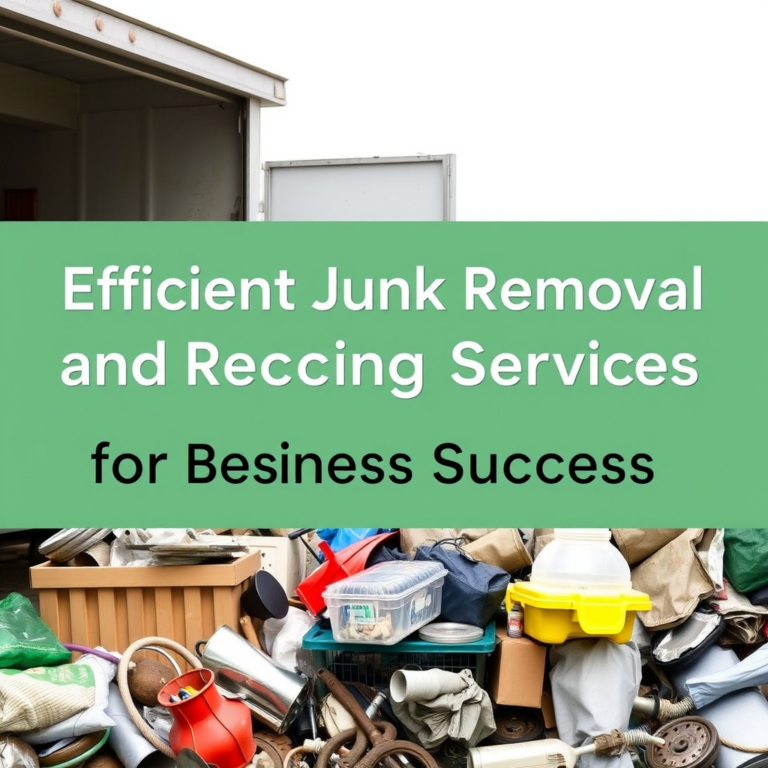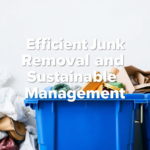Efficient Junk Removal and Recycling Services for Business Success
In the modern business landscape, the significance of managing waste efficiently cannot be overstressed. Gone are the days when waste management was merely about decluttering spaces. Today, efficient junk removal services are pivotal to enhancing business operations, promoting sustainability, and optimizing costs. By strategically handling waste through professional services, companies can focus on core functions while also boosting their environmental responsibility.
Understanding the Importance of Efficient Junk Removal
Businesses today grapple with the complex challenge of managing waste sustainably. Efficient junk removal plays a dual role by not only clearing excess material but also enhancing productivity. By instituting regular systems for waste removal and recycling, companies can significantly reduce the time and resources previously spent on managing surplus. A well-devised strategy for waste management can help businesses concentrate more on their goals while keeping their environmental commitments intact.
Streamlining Operations with Professional Services
Engaging professional junk removal services extends beyond the benefit of convenience. These services are integral to refining operations by clearing out unnecessary clutter and allowing employees to prioritize important tasks. A clutter-free environment is instrumental in fostering an efficient workflow and elevating employee morale, ultimately enhancing productivity.
Case in Point: Consider a mid-sized tech company that saved over 30 hours a month by outsourcing its junk removal needs. This strategic move allowed them to redirect their human resources towards innovative projects that propelled their growth.
Boosting Sustainability through Effective Recycling
In an era marked by growing environmental awareness, incorporating recycling into waste management strategies is no longer optional. Efficient junk removal services provide comprehensive recycling options, aiding businesses in reducing their carbon footprints. By ensuring proper sorting and processing of recyclable materials, these services contribute significantly to a circular economy.
Adopting sustainable practices is not only beneficial for the planet but also advantageous for business reputation. Companies recognized for their green initiatives often attract partners and consumers who value environmental consciousness, fostering loyalty and trust.
Cost-Effective Strategies for Waste Management
Embracing a pragmatic approach to junk removal and recycling can profoundly impact a company’s bottom line. By reducing waste and promoting reuse, companies can considerably slash disposal costs. Many junk removal services offer tailored plans, enabling businesses to avoid the inefficiencies and expenses associated with generic solutions.
For practical implementation, businesses can adopt the following strategies:
- Regular Audits: Conduct regular waste audits to identify materials that can be reduced, reused, or recycled.
- Partnering with Services: Collaborate with specialized junk removal services that are equipped to handle complex waste effectively.
Selecting the Right Junk Removal Partner
Choosing the appropriate junk removal service is crucial for aligning with sustainability goals and ensuring efficient waste management. Companies should evaluate potential partners based on factors such as expertise, pricing, and recycling capabilities.
Key Considerations:
- Reputation and Experience: Opt for service providers renowned for reliability and proficiency in handling business waste.
- Technological Capabilities: Select services that employ sustainable technologies and practices to enhance recycling processes.
- Comprehensive Solutions: Ensure the provider offers integral solutions encompassing collection and recycling.
Integrating an Efficient System Across Departments
Successful waste management hinges on collaboration among all departments within a company. Training employees and instilling practices that support sustainability are paramount. Establishing a waste management policy can seamlessly integrate these practices into daily operations.
Example: A retail business achieved a remarkable 50% reduction in waste within a year by conducting regular employee training and engaging each department in sustainability initiatives.
The Role of Technology in Waste Management
Technology plays a transformative role in enhancing the efficiency of junk removal and recycling processes. Innovative solutions like IoT devices offer detailed insights into waste production patterns, enabling businesses to refine their strategies.
Moreover, AI-powered systems facilitate the categorization of waste types, ensuring optimal allocation of resources for recycling versus disposal. Companies that leverage such advanced solutions often witness significant improvements in efficiency and cost savings.
Conclusion: Making Junk Removal a Strategic Priority
Incorporating efficient junk removal and recycling systems is not merely an operational task; it is an essential strategic priority for ensuring business success. As organizations increasingly prioritize eco-friendly practices, partnering with professional services emerges as a competitive advantage. Consequently, businesses enhance operational efficiency and fortify their commitment to sustainability, securing long-term success and a robust brand reputation.





